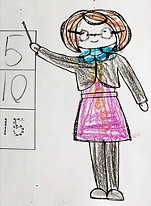The surprise exam
Preface
 This was written in 2009. I explain why I think the surprise exam paradox is just a subtle version of the paradox of the heap. This was not easy to figure out because this is one of the most confusing paradoxes in the world.
This was written in 2009. I explain why I think the surprise exam paradox is just a subtle version of the paradox of the heap. This was not easy to figure out because this is one of the most confusing paradoxes in the world.
 This was written in 2009. I explain why I think the surprise exam paradox is just a subtle version of the paradox of the heap. This was not easy to figure out because this is one of the most confusing paradoxes in the world.
This was written in 2009. I explain why I think the surprise exam paradox is just a subtle version of the paradox of the heap. This was not easy to figure out because this is one of the most confusing paradoxes in the world.
6. The one-day case
In our pared-down case, involving just one school day, the teacher says this to the class:
In this respect, the situation equals the birthday case, where your niece’s words were essentially:
In contrast, we may presume that the teacher’s announcement is not likewise “innocent”. Rather, she means to throw the class for a loop, knowing that they cannot accept both parts of her announcement and also have no grounds to favour either part over the other! So they can accept neither part of her announcement and can only disregard her words in their entirety. Conditions are then ripe for her words to come true: she can easily surprise them with an exam tomorrow.
Even more clearly then, her words may be true, even though the class cannot know them to be true, and so the one-day announcement is decidedly a blindspot for the class.
Having registered that, it is useful to make a certain comparison between this simple one-day case and the normal five-day case. This will bring the entire paradox into focus.
The one-day announcement was this:
Notice now that the original five-day case may be interpreted in the same way. The five-day announcement was essentially this:
From this point of view, the student is accusing the five-day announcement of being a more sophisticated form of the blindspot that is the one-day announcement. In my opinion, this is what is really going on in the surprise exam paradox and I will pursue it from this angle henceforth.
As before, the student’s charge should seem quite dubious since the five-day announcement does not seem to be “defective” in any way comparable to the one-day announcement, which is obviously a very bad joke. On the other hand, there presumably may be propositions so subtle (or complex) that they prove to be blindspots only upon close inspection, but not at first sight. So it is not out of the question that the student may be right.
To properly evaluate the student’s charge, we need to examine his reasoning, but we cannot easily do that while it remains phrased in the mocking style just displayed. We should first “unmock” his argument by expressing it more plainly. Here’s what I take to be a meaningful reconstruction of the overall structure of his argument.
Starting with the fact that the one-day announcement is a blindspot for the class, he proposes to demonstrate that so is the two-day announcement, and thereafter the three-day announcement, and so on, up to the five-day case.
If we spell out the details, we will find this reconstruction to be faithful to the spirit of the paradox. Moreover, the student’s contention also proves to be quite powerful!
The essentials are contained in his “proof” that if the one-day announcement is a blindspot (as we have just seen it is), then so is the two-day announcement. So we should turn to this at once.
In our pared-down case, involving just one school day, the teacher says this to the class:
There’ll be an exam tomorrow but you don’t know this.
In this strange case, the class cannot take her words seriously because they cannot sensibly accept both parts of her announcement. Clearly, if they accept the first part, they cannot accept the second, and vice versa. In this respect, the situation equals the birthday case, where your niece’s words were essentially:
You’ll have a party tomorrow but you don’t know this.
There is one difference however. Your niece’s declaration was presumably “innocent,” so that, upon hearing her words, you should presumably accept the first part and reject the second. (The party will occur but it will no longer be a surprise.)In contrast, we may presume that the teacher’s announcement is not likewise “innocent”. Rather, she means to throw the class for a loop, knowing that they cannot accept both parts of her announcement and also have no grounds to favour either part over the other! So they can accept neither part of her announcement and can only disregard her words in their entirety. Conditions are then ripe for her words to come true: she can easily surprise them with an exam tomorrow.
Even more clearly then, her words may be true, even though the class cannot know them to be true, and so the one-day announcement is decidedly a blindspot for the class.
Having registered that, it is useful to make a certain comparison between this simple one-day case and the normal five-day case. This will bring the entire paradox into focus.
The one-day announcement was this:
There’ll be an exam tomorrow but you don’t know this.
Notice that, confronted with such a dastardly announcement, a disgruntled student may mock it as follows:Ah, but what you say cannot be true! For now that we know the exam is tomorrow, you are wrong to say that we don’t!
This would be sarcasm of course; a joke of sorts. The point isn’t really that the teacher’s words can’t be true but only that the class cannot take them seriously: as soon as they do, they can “deduce” that her words are false. So this mocking retort is an artful way of protesting that the teacher’s announcement is self-defeating, or a blindspot for the class.Notice now that the original five-day case may be interpreted in the same way. The five-day announcement was essentially this:
There will be an exam on one of the next five days but you won’t know which day until it arrives.
And the clever student retorts:Ah, but what you say cannot be true! The exam can’t be on Friday since we’d know about it by Thursday’s end. Nor can it be on Thursday since we’d know about it by Wednesday’s end, given that Friday is ruled out. Nor can it be on Wednesday, Tuesday or Monday, and so it can’t occur at all!
At first sight, the protest is that the teacher’s words cannot be true but, as I hope is clear by now, it makes more sense to view the student as mocking her words instead, in exactly the same style shown above. His artful point is that the class cannot take her words seriously: as soon as they do, they can “deduce” that her words are false.From this point of view, the student is accusing the five-day announcement of being a more sophisticated form of the blindspot that is the one-day announcement. In my opinion, this is what is really going on in the surprise exam paradox and I will pursue it from this angle henceforth.
As before, the student’s charge should seem quite dubious since the five-day announcement does not seem to be “defective” in any way comparable to the one-day announcement, which is obviously a very bad joke. On the other hand, there presumably may be propositions so subtle (or complex) that they prove to be blindspots only upon close inspection, but not at first sight. So it is not out of the question that the student may be right.
To properly evaluate the student’s charge, we need to examine his reasoning, but we cannot easily do that while it remains phrased in the mocking style just displayed. We should first “unmock” his argument by expressing it more plainly. Here’s what I take to be a meaningful reconstruction of the overall structure of his argument.
Starting with the fact that the one-day announcement is a blindspot for the class, he proposes to demonstrate that so is the two-day announcement, and thereafter the three-day announcement, and so on, up to the five-day case.
If we spell out the details, we will find this reconstruction to be faithful to the spirit of the paradox. Moreover, the student’s contention also proves to be quite powerful!
The essentials are contained in his “proof” that if the one-day announcement is a blindspot (as we have just seen it is), then so is the two-day announcement. So we should turn to this at once.
Menu
 What’s a logical paradox?
What’s a logical paradox? Achilles & the tortoise
Achilles & the tortoise The surprise exam
The surprise exam Newcomb’s problem
Newcomb’s problem Newcomb’s problem (sassy version)
Newcomb’s problem (sassy version) Seeing and being
Seeing and being Logic test!
Logic test! Philosophers say the strangest things
Philosophers say the strangest things Favourite puzzles
Favourite puzzles Books on consciousness
Books on consciousness Philosophy videos
Philosophy videos Phinteresting
Phinteresting Philosopher biographies
Philosopher biographies Philosopher birthdays
Philosopher birthdays Draft
Draftbarang 2009-2024  wayback machine
wayback machine
 wayback machine
wayback machine
 Paradox Lost (1971), by Ian Stewart.
Paradox Lost (1971), by Ian Stewart.



